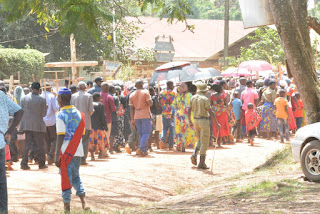Kisiizi Hospital is 66 years old!
In 1958 a large crowd came here to commit to God the building of the Hospital
in this remote, mountainous part of south west Uganda. The basic facilities
with just a few staff that existed then have grown to the substantial hospital
that is here today.
Each year, to celebrate its founding and to thank God for what He has done through the Hospital and its staff there is a week of special clinics where patients attend for free because normal consultation fees (of less than £1 or almost a day’s minimum pay) are waived. This attracts a large number of people with health concerns who would normally be put off because of the cost. On ’Kisiizi Day’, the official birthday of the Hospital, staff gather for a short service, entertainment and cake,
For the celebration students from the Hospital’s School of
Nursing performed a traditional dance. Malcolm would love to explain what it
was about but his knowledge of the local tribal language, Rukiga (pronounced
Roo- chig-a), isn’t good enough!
Staff each month vote for the ‘Employee of the Month’ and
this was an opportunity to honour this
year’s 12 winners. Staff also voted for
the ‘Employee of the Year’ which was won by Dr. Paul Matovu. Because he was
working his wife, Becky, accepted the reward for him. This was presented by Dr
Henry, the Medical Superintendent .
Malcolm is getting ready to return home and to hand over his
work to the other staff in the Accounts department. The Accountant, Lynn has returned
from maternity leave with a baby boy and is back at work.
One of the main functions of the office is the cashier service which receives the income from patients and others manages the payments to staff and suppliers etc and calculates the bills for in-patients. , The service is open 7 days a week, 12 hours a day and is provided by 3 accountancy assistants, Esther, Lean and Sabiiti, To help Malcolm with some of the work, the Deputy Principal Nursing Officer, Sister Agnes spends half her time in the office helping to prepare payment vouchers, checking that claims for payment are legitimate and chasing people for signatures.
Peter is currently a ‘volunteer’ on a small allowance who provides back-office support.
Berlina manages the finances of the HIV /AIDS project funded
by USAID, the USA Government’s International Aid agency.
One of Malcolm’s last jobs is to update his wardrobe of
African style shirts. The Hospital’s tailor, Sam, (who is also pastor of a
local Assemblies of God church), was able to make one to measure. Just right
for a celebration event!























































